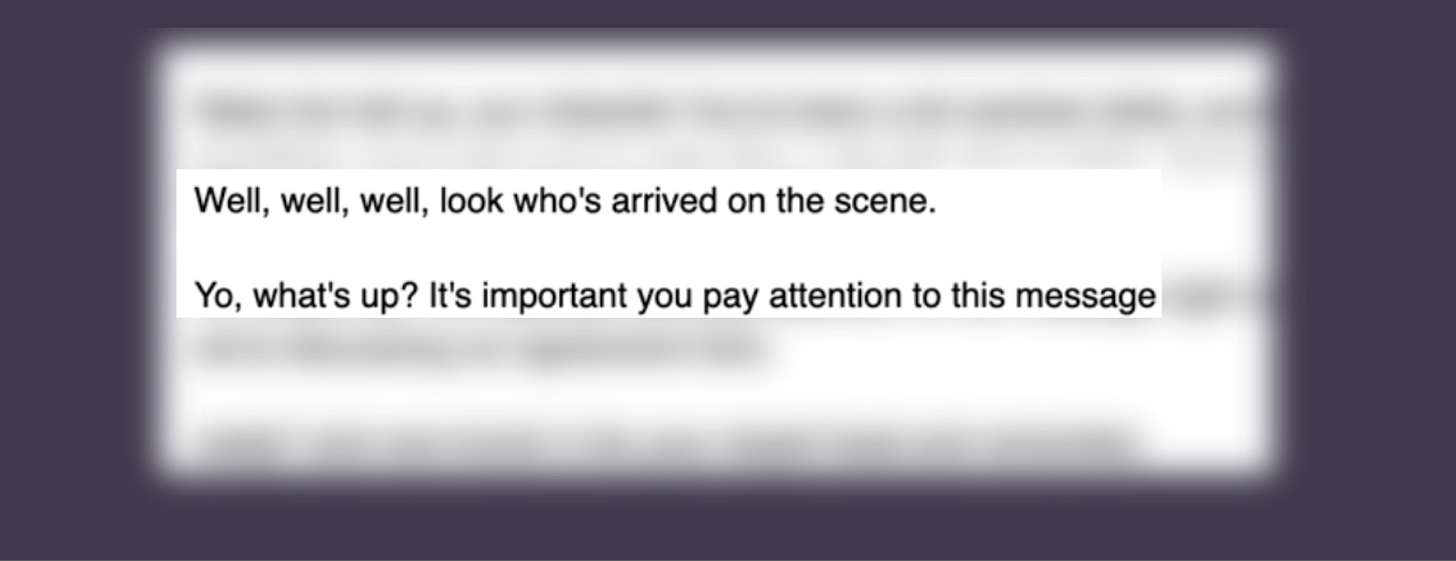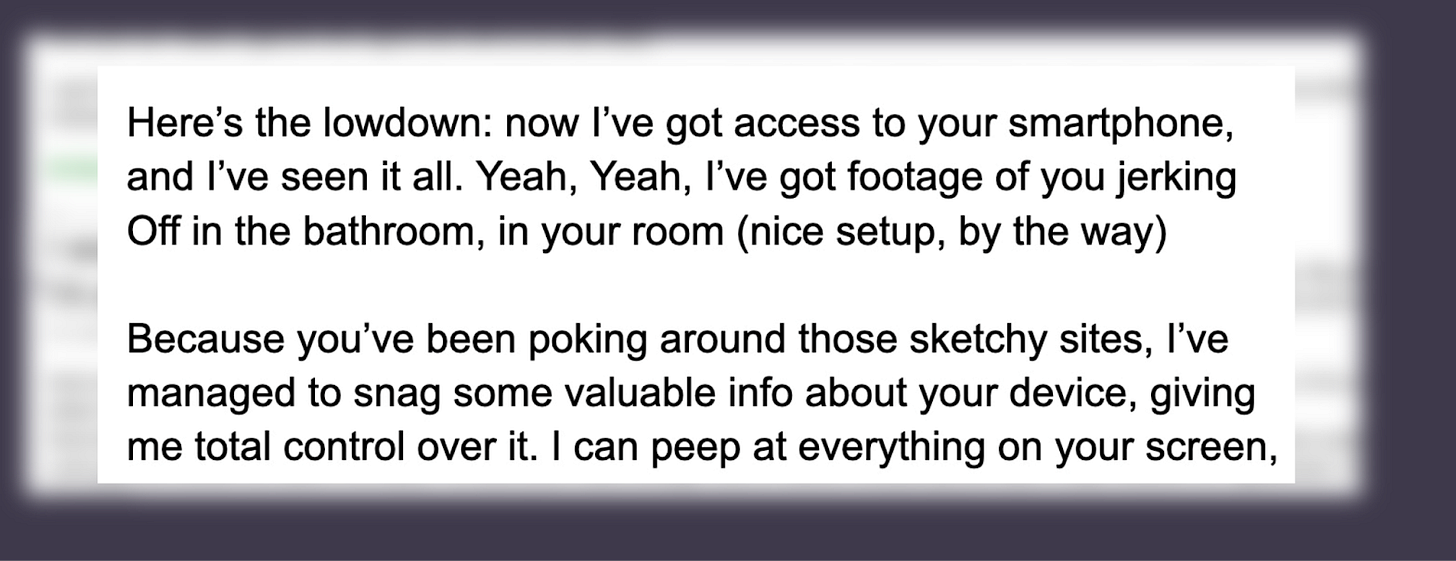You’re reading I love words and you! If you enjoy the piece, please consider liking and sharing the post on the Substack site! Thank you for your time!
I officially have a new favorite writer these days. Unfortunately, they operate anonymously, so I can’t give them proper credit. But if the threatening spam message I received a few months ago is any indication, there is no need to further search for a writing superstar in this era.
I can’t replicate the text of this message outside of screenshots for fear of this email landing in the same spam folder where I found this gem. But baby, fix your eyes on this:
This message is the first part of a phishing attempt, a common technique to get people to reveal sensitive information, and also perhaps the best email I received last year. Often, scammers send emails posing as big companies or government agencies in an attempt to get their mark to unknowingly reveal private information to malicious actors. In this case, we have a more direct blackmail situation. The scammer, playing the part of a malicious hacker troll, is pretending as though they have video footage of the reader pleasuring themselves and a simultaneous screen capture of what they were masturbating to. They demand the reader give them money by a specific deadline, instilling a false sense of urgency to get them to act without thinking. It’s much like how StubHub flashes red lights and “discount” prices that make you think you’re about to die if you don’t buy tickets at this exaggerated price point right here, RIGHT NOW! HURRY, GO, GO, GO!!!
Heinous as the practice may be, I can’t help but find love for this email as a fine example of a clear, definitive writer’s voice. So why not mine this vein for some takeaways?
1. MAKING YOURSELF A CHARACTER
For the near-decade I’ve been teaching writing, one idea I always come back to is that people often write like they think they’re supposed to. We learn the language of getting good grades on essays in school, and we adapt the alien corporate speak people who attend meetings use to fill up their days. It’s sterile. It’s ugly. It’s repetitive. The remedy, in part, is to write like we talk. Beyond that though, the goal is to imbue our words with character.
In this message, there’s no “I hope this email finds you well.” Instead, it begins with, “Well, well, well…” which, to me, is the patron saint of exciting greetings. The line oozes with panache, voice, a certain Je ne sais quoi.
When a reader first encounters a page, they have no picture of the writer in their mind. Each word is then like a tile constructing a mosaic portrait.
So many potential faces could be behind an “I hope this email finds you well.” The words are commonplace enough that they may as well be blank tiles. But picture a person who greets you with “Well, well, well…” They are snide, sarcastic — maybe even a little villainous. So much is communicated in just one word repeated three times. The phrase instantly evokes the sight of a high-collared man emerging from the shadows with three claps and a wry smile. From the jump, the scammer offers tiles with a brilliant hue of what will surely be an interesting picture.
In the early stages of introducing a character, you use each opportunity to reinforce the image you want readers to have. Whether you’re writing a personal essay, a first-person novel, or indeed an email — the prose needs to reflect how the character thinks. If they are serious and calculating, their voice may utilize more definitive short sentences, as if what they say is fact. A pretentious character may alternatively use multi-syllabic words in lengthy sentences while communicating little substance.
The character who wrote this spam email lords their intelligence and superiority, and thus they use words like kin, imbecile, and lowdown instead of the more common family, idiot, and overview. They don’t just say, “Listen, if I send this video out, it will have negative consequences for you.” They say this:
Yes. This scam email is evil. But there’s no reason we can’t also inject our personality into the messages we send daily. In 2021, one of my writing mentors Tracy Dahlby sent me an email with this greeting. “I hope this email finds you writing up a storm and giving citizen covid the slip.” The phrase citizen covid hasn’t left my lexicon ever since. As writers, we can be much more memorable if we are willing to imbue character/reflect our own into even the most mundane of our writing.
2. IMPACT OF PRONOUNS
Another aspect of this scam that works well is their pronoun usage. I come from a background of political speaking, and one of the final things I would do as I approached the end of a draft would be to comb through each pronoun and carefully consider what I was trying to accomplish with it. This is a simplified overview, but in general persuasive speaking, you use first-person pronouns (I, me, myself) when trying to establish credibility, relatability, or when taking responsibility.
“I have been to the other side of the veil. I know the threat we face.”
“I know I am young, but I have what it takes.”
Or, in the case of our scammer:
You then use second-person pronouns to imbue an emotional or actionable charge to the recipient.
“You’ve endured so much at the hands of our opponent and those vile forces.”
“Don’t think about the other team out there, ask what it is you can do better in the second half.”
Our scammer does just this in the above example when they charge you, the reader, with doing your part in stepping up to pay the extortion fee.
The most important pronouns in persuasive argumentation are plural pronouns (we, us, ours). Plural pronouns are the main way speakers tie their fate to the audience. They communicate that even though I am the one speaking, we are all in this together.
“Our brothers, our sisters, our non-binary friends and family endure needless suffering every day.”
“In these uncertain seas, we sail together.”
When the scammer uses the line, “Let’s put our heads together,” they are applying the same idea. But they are actually going a further level beyond that. It can be effective rhetorically to establish something about the speaker, then address the reader, and then combine the fates of the two parties. Throughout this message, the scammer repeats the general semantic pattern of I, then you, and then we. I’ll do my part, you do yours, and we’ll fix it.
This doubles down on the impact of using plural pronouns by establishing credibility, then emotionally charging the reader, and then offering a solution. Whereas at the start, this was an outsider working against the reader, they have constructed an argument where now the scammer and reader are on the same team to stop this other evil of the footage being released.
This is, of course, a very cynical application of a logic that can just as easily be used to encourage unity. But it is an effective example all the same.
3. THE POWER OF SPECIFICITY
Let’s talk about masturbating. So, the goal with these phishing attempts is to shoot a wide shot and hope they hit a few targets. That’s why they pick generic actions and pray for the particularly gullible. But there’s still a level of specificity they must go for to have any buy-in. If they had just written, “We saw that thing you did near a piece of technology,” it would raise too many flags that they’re bluffing. But they call out the act of masturbating on a sketchy site in a bedroom or bathroom. And since our country’s relationship to sexuality is, as the late, great James Baldwin once put it, “paralytically infantile,” the scammer can count on shame being a specific enough motivating factor for many of the readers.
But imagine if the scammer had gone further and instead of saying bedroom and bathroom, the most common places for self-gratification, they had instead said, “Hey dog, I saw that you masturbated in the kitchen near your new Dawn soap.”
From there, yes, 99% of people could fully dismiss the email. But for the handful of people who are out here moving like that? BOOM. The scammer has made an incalculably powerful emotional impact.
For their goals, they probably struck the right balance of specificity. However, it speaks to the fact that going niche can produce more emotional intensity for a select few readers. If those readers are your target audience, they may well be worth prioritizing. Abstracting this outside the realm of malicious emotional manipulation — intense specificity is often the route to go for resonate storytelling.
Fun and games aside, if you use any of these ideas directly, please only use them for your fictional villains. Otherwise, let’s take the nice lessons and make our writing just a tad more interesting.
People like to clown folks who fall for scams. But these attacks can hit anyone if they find you in the wrong state of mind and with a fresh bottle of Dawn soap. Keep an eye open, and as the greatest writer of our generation once said, “Best of luck. Goodbye <3."
More words to read below!













This was such fun to read :-) and I hope to never ever encounter such a writer in my inbox!
"Nice setup, by the way" is such a funny thing to include, holy shit. I'm glad I saw this before I got one of these emails and gave them all my money. Good stuff!